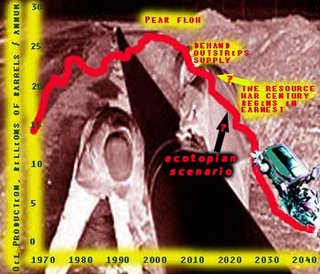Peak Oil Deniers - Get Your Heads Out of the Sand!
 Regarding the piece by Yergin in the Washington Post, It's Not the End Of the Oil Age - Technology and Higher Prices Drive a Supply Buildup, run July 2005.
Regarding the piece by Yergin in the Washington Post, It's Not the End Of the Oil Age - Technology and Higher Prices Drive a Supply Buildup, run July 2005.http://www.washingtonpost.com
I saw this in a post to the bluegreenearth website's Yahoo Group, at groups.yahoo.com/group/bluegreenearth/, from regular contributor (sic) Paul Illich. It may not be bang up to date, but I believe it is representative of a growing trend amongst the 'green-washers' and gainsayers, playing a game with our very lives for their own smug and selfish ends.
As usual Yergin is addressing a straw man (or would be if he used the phrase 'peak oil' in his piece).
The peak oil argument is not, and never has been, an argument that we have run out of oil, and does not imply that we will ever completely run out of the substance.
It says that all oil-fields reach a point where costs of extraction rocket, and that all fields thus become nonviable a certain time after the peak flow. This peak is not merely "50% of field gone", but is, rather, determined by the cost of extraction as well as by technical challenges as the pressure drops etc - here I am focusing on the economic, rather than practical, costs and problems. Whilst economic costs will rise, the market can bear more when the material becomes scarcer (using current technology) - ie, as new technology is applied, or old but expensive technology becomes useful again, a flow continues and the market bears the extra cost - people pay more.
However, another cost becomes important as the reserve drops still further - the energy used in extraction itself will outstrip the energy we can get from the oil. This point, strictly speaking, is far off and close to the fields end, but adding in those economic costs (processing, transport, etc), will in effect be reached all the sooner. At this point only a few can pay more, most going without.
The idea that "the market" can bear a higher cost bears some analysis - not all actual humans, most being from poor nations, or poor classes in richer nations, will be buying this expensive oil. The idea that if 'the market' can bear it, then all is roses in the garden is nonsense. What it really means is an "I'm alright, Jack" from the rich nations / the rich in the rich nations. Thus, it is idiotically complacent to think that there will not be consequences if a "market can bear it" attitude is taken. Today's "war on terror" (or, US global terror regime to keep alternative regimes down) will be a child's tea party. Society recalibrates and the effects hit us all.
So, hell yes, oil will be around for a lot longer - for the rich. Pollution and anti-pollution costs will rise; pressure on "socialistic" measures such as state health care, unemployment provision, schooling... will rise; opposition will rise; military adventurism throughout the world on the part of both imperialist USA, NATO, and their 'enemies' will rise; defensive measures from resource rich nations will rise; civilian distress will rise...
Basically, the window of opportunity we have had for the last seventy years of human history will slam shut.
What window is that?, you may ask. Technology and science (both lambasted by the Luddites) are not ethically value neutral in their uses, sure, but they have developed, alongside a rise in secularism and rationalism, to a point where we had the choice, if we would but choose it, to live in harmony with both other cultures and the wider environment. We had the chance to be stewards of the earth, if you will, rather than it's murderers. A study of our "nature", of political alternatives, etc has long led me to believe that this was eminently possible, and at the same time rather unlikely.
Yergin's attitude of complacent head-in-the-sandism is representative of the neo-liberal, selfish, gung-ho attitudes that are pervasive in American politics and corporations, and increasingly so in the UK too. As this short-termist attitude spreads through other lands, such as China, we accelerate toward our doom.
The response to an awareness that the world peak in oil (absolutely not the only resource we have to worry about, but the one most deeply hardwired in western societies daily lives, via transport, agriculture, the manufacture of our toys and tools...) is upon us, and that all fields will be non-viable in maybe a hundred to a hundred and fifty years, should not be "well, that's OK then, not our problem".
The problems start now, and accelerates over the next few generations, at some point reaching a time when we return to a human story that boils down to Hobbes "solitary, poor, nasty, brutish, and short". This is avoidable, and if we give a fuck about our children and their children, as well as ourselves, we must fight the smug complacency that Yergin is representative of in his work for CERA. He is not dumb, so I must assume his to be a wilful misrepresentation of the arguments of people like Richard Heinberg, Jan Lundberg, etc - ie: deliberate sabotage from those with more to gain from mankind's demise than from our survival. And we wonder why revolutionaries end up killing the opposition?
Why the scramble to return to the horrors of our past, when we can choose to have a future for all?



